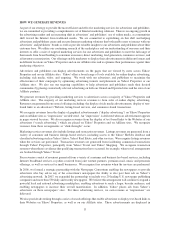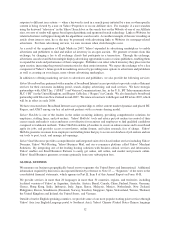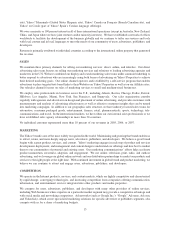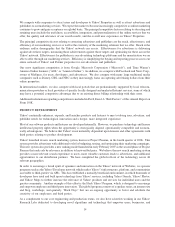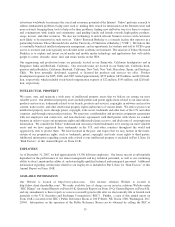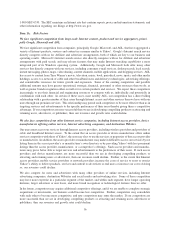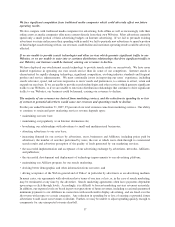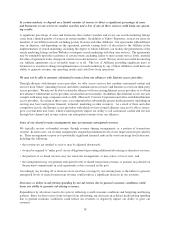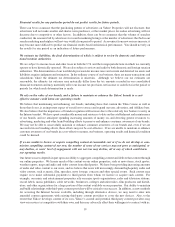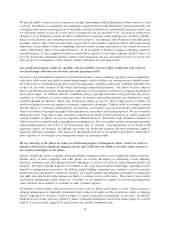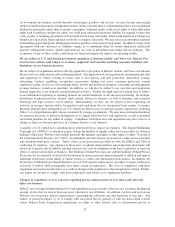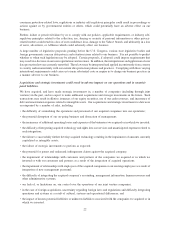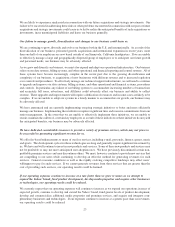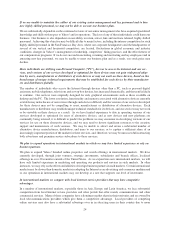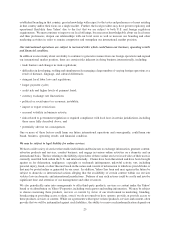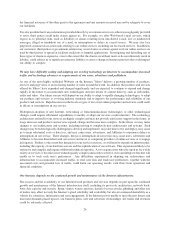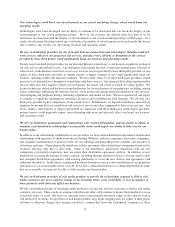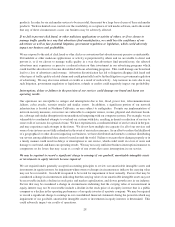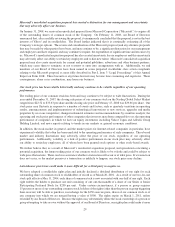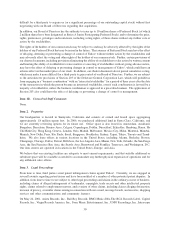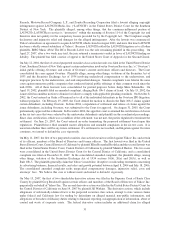Yahoo 2007 Annual Report Download - page 23
Download and view the complete annual report
Please find page 23 of the 2007 Yahoo annual report below. You can navigate through the pages in the report by either clicking on the pages listed below, or by using the keyword search tool below to find specific information within the annual report.As we expand our business and develop new technologies, products and services, we may become increasingly
subject to intellectual property infringement claims. In the event that there is a determination that we have infringed
third-party proprietary rights such as patents, copyrights, trademark rights, trade secret rights or other third-party
rights such as publicity and privacy rights, we could incur substantial monetary liability, be required to enter into
costly royalty or licensing agreements or be prevented from using such rights, which could require us to change our
business practices in the future and limit our ability to compete effectively. We may also incur substantial expenses
in defending against third-party infringement claims regardless of the merit of such claims. In addition, many of our
agreements with our customers or Affiliates require us to indemnify them for certain third-party intellectual
property infringement claims, which could increase our costs in defending such claims and our damages. The
occurrence of any of these results could harm our brand and negatively impact our operating results.
We are subject to U.S. and foreign government regulation of Internet, mobile, and Voice over Internet Pro-
tocol services which could subject us to claims, judgments and remedies including monetary liabilities and
limitations on our business practices.
We are subject to regulations and laws directly applicable to providers of Internet, mobile, and Voice over Internet
Protocol services both domestically and internationally. The application of existing domestic and international laws
and regulations to Yahoo! relating to issues such as user privacy and data protection, defamation, pricing,
advertising, taxation, gambling, sweepstakes, promotions, billing, real estate, consumer protection, content
regulation, quality of services, telecommunications, mobile and intellectual property ownership and infringement
in many instances is unclear or unsettled. In addition, we will also be subject to any new laws and regulations
directly applicable to our domestic and international activities. Further, the application of existing laws to Yahoo!
or our subsidiaries regulating or requiring licenses for certain businesses of our advertisers including, for example,
distribution of pharmaceuticals, alcohol, adult content, tobacco or firearms, as well as insurance and securities
brokerage and legal services, can be unclear. Internationally, we may also be subject to laws regulating our
activities in foreign countries and to foreign laws and regulations that are inconsistent from country to country.
Recently, plaintiffs have attempted to use U.S. statutes in efforts to recover damages against corporations, including
Yahoo!, for alleged human rights abuses committed by foreign governments. We may incur substantial liabilities
for expenses necessary to defend such litigation or to comply with these laws and regulations, as well as potential
substantial penalties for any failure to comply. Compliance with these laws and regulations may also cause us to
change or limit our business practices in a manner adverse to our business.
A number of U.S. federal laws, including those referenced below, impact our business. The Digital Millennium
Copyright Act (“DMCA”) is intended, in part, to limit the liability of eligible online service providers for listing or
linking to third-party Websites that include materials that infringe copyrights or other rights of others. Portions of
the Communications Decency Act (“CDA”) are intended to provide statutory protections to online service providers
who distribute third-party content. Yahoo! relies on the protections provided by both the DMCA and CDA in
conducting its business. Any changes in these laws or judicial interpretations narrowing their protections will
subject us to greater risk of liability and may increase our costs of compliance with these regulations or limit our
ability to operate certain lines of business. The Children’s Online Protection Act and the Children’s Online Privacy
Protection Act are intended to restrict the distribution of certain materials deemed harmful to children and impose
additional restrictions on the ability of online services to collect user information from minors. In addition, the
Protection of Children From Sexual Predators Act of 1998 requires online service providers to report evidence of
violations of federal child pornography laws under certain circumstances. The costs of compliance with these
regulations may increase in the future as a result of changes in the regulations or the interpretation of them. Further,
any failure on our part to comply with these regulations may subject us to significant liabilities.
Changes in regulations or user concerns regarding privacy and protection of user data could adversely
affect our business.
Federal, state, foreign and international laws and regulations may govern the collection, use, retention, sharing and
security of data that we receive from our users, advertisers, and Affiliates. In addition, we have and post on our
Website our own privacy policies and practices concerning the collection, use and disclosure of user data. Any
failure, or perceived failure, by us to comply with our posted privacy policies or with any data-related consent
orders, Federal Trade Commission requirements or orders or other federal, state or international privacy or
21


